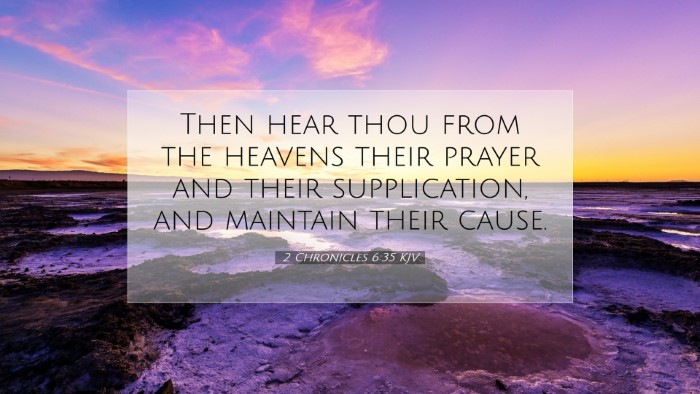2 Chronicles 6:35 Commentary
Verse Analysis: 2 Chronicles 6:35 states, “Then hear thou from the heavens their prayer and their supplication, and maintain their cause.” This verse encapsulates King Solomon’s prayer during the dedication of the temple, emphasizing the need for God's divine attention to the prayers of His people. Solomon, the son of David, acknowledges God's supreme authority and His dwelling in the heavens while simultaneously expressing humanity’s reliance on God’s mercy and intervention.
Contextual Background
This verse falls within the broader context of Solomon’s dedicatory prayer in 2 Chronicles 6. Solomon had just completed the construction of the temple, which was a monumental event in Israel’s history. The temple was not merely a building; it was intended to be the dwelling place of God among His people.
In this prayer, Solomon intercedes on behalf of Israel, requesting God’s attention to their prayers and supplications when they turn to Him in times of need. This reflects the understanding that God's house is a place of prayer and supplication, highlighting the importance of recognizing God as both transcendent and immanent.
Theological Insights
1. Divine Attention and Human Supplication: Solomon’s plea invites a profound theological reflection on the relationship between God and His people. As Matthew Henry comments, the acknowledgment that God should hear from “the heavens” emphasizes God's majesty and transcendence. Yet Solomon’s request indicates a belief that despite God’s exalted position, He is still attentive to the needs of His people.
2. The Function of Prayer: Albert Barnes elaborates on the significance of prayer and supplication in this context. He notes that prayer is not merely an act of recitation but a deep expression of the heart’s longing for communion with God. Thus, in invoking God’s attention to their prayers, the people recognize their dependence on Him for justice, mercy, and support.
3. Restoration and Justice: Solomon entreats God to “maintain their cause,” which opens a dialogue on divine justice. Adam Clarke comments on this phrase as a request for God to advocate for Israel, a misunderstood and often persecuted nation. This idea highlights the call for divine adjudication in their adversities, affirming God’s role as a protector and defender of His people.
Practical Implications for Believers
In understanding 2 Chronicles 6:35, there are practical implications for pastors and church leaders today:
- Prayer as a Central Focus: The emphasis on prayer reminds churches of the necessity of fostering a prayerful spirit within their communities. Congregations should be encouraged to bring their struggles and desires before God.
- Trust in God’s Sovereignty: Solomon’s acknowledgment of God’s authority is a call to trust in God’s overarching plan. Pastoral counseling should lead individuals to understand that God is sovereign and hears their prayers, even when the answers are not immediately apparent.
- Advocacy for Justice: The call for God to “maintain their cause” is a challenge for believers to advocate for justice in their communities. Christians are encouraged to take an active role in promoting justice and reconciliation in society.
Conclusion
2 Chronicles 6:35 serves as a powerful reminder of God's attentiveness to our prayers. In Him, we find a listening ear in heaven, ready to respond to the petitions of His people. As Solomon interceded for Israel, so too should our prayers seek God's intervention in our lives and communities.
Thus, as we reflect on this verse, may we be motivated to pray fervently, trust unwaveringly, and advocate boldly for the causes dear to our hearts, knowing that our God is both high and lifted up and yet intimately involved in the affairs of His people.


